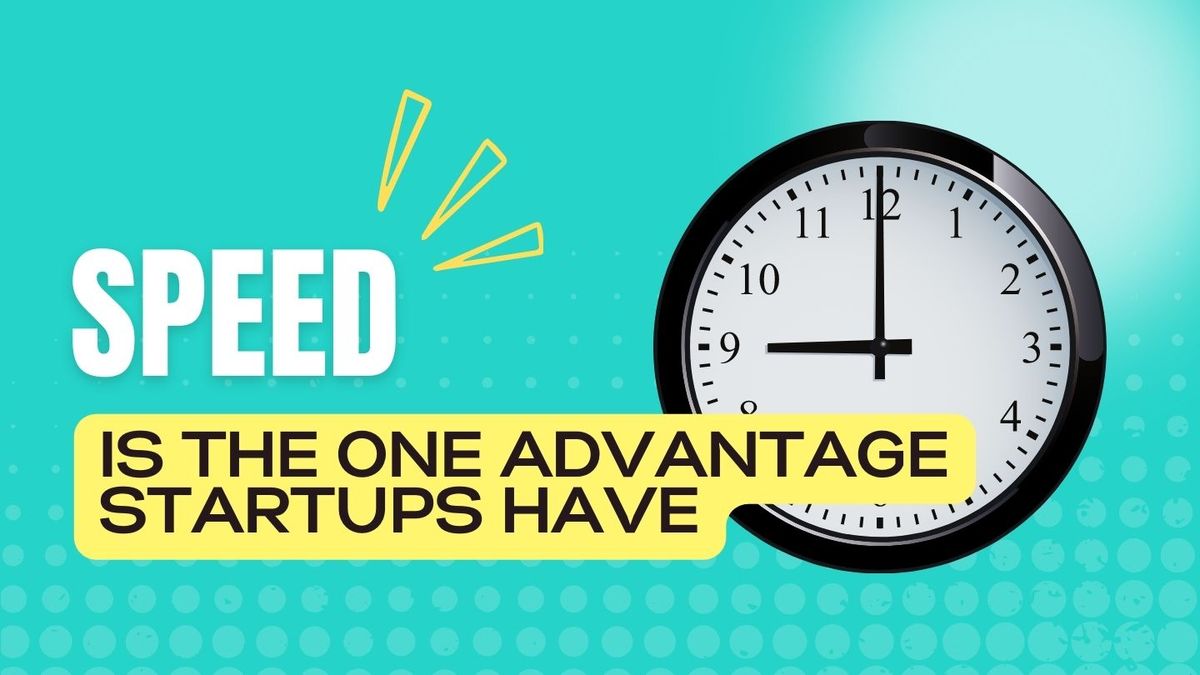Speed Is The One Advantage Startups Have
Speed is the one advantage that startups have and you need to be taking advantage of it.

In the real world, any product you create is likely to compete with others for your customers' attention. This competition is often with companies that have way bigger teams, a stronger presence, and much more money than you. Speed is the one advantage that startups have over these more established companies. Moving quickly is something I push for relentlessly, in fact, people are probably sick of me saying it, but being efficient and taking advantage of market openings by being quick is the only opening for success you will likely see on your startup journey.
Why Speed Matters
Well if the deck is so stacked against founders, competing against companies with so many resources behind them, how can speed make any difference?

Market Adjustments
The digital world changes at a breakneck pace. As a startup founder you can take advantage of that. Leveraging your existing and new markets is the most important advantage you can have by being quick.
As we know, the larger something is the harder it is to turn. This is especially relevant for more established companies. A more established company is often going to have processes in place that do not enable them to make quick market pivots. This is most apparent with employees not having direct autonomy and having to send information up a chain of management until you reach a decision-maker. This information chain can be time-consuming. This is a prime opportunity, for you, the speedy startup to pivot quickly into this opening and really get the first-mover advantage.
On top of these established companies being slow, there is a very real possibility of them not producing any change whatsoever. This lack of change is typically because of two things: momentum and comfort. Two things that you definitely don't have at a startup. Next time a new social tool starts, you see sudden changes in market trends, or whatever market opportunity it may be, make sure you are positioned to be able to take advantage of it as quickly as possible.
Product Iteration
The thing that most people think about when moving quickly at a startup is iterating on the product, and for good reason, as it has the potential to be a major advantage.
There are three major benefits of fast product iteration I want to talk about. Being able to iterate on your product quickly is the main way to take advantage of market adjustments. If you can build quicker than your competitors then that means you can be faster to markets, innovate more, and uncover more competitive advantages.
At Tactycs we switched from a model that was more traditional in that changes were slower and more methodical. This is great if you already have a solid foundation, but without that foundation, all you are doing is falling behind your competitors or forever playing catch-up. After switching to a rapid development microtool approach we have validated (and un-validated) several product ideas, tested dozens of marketing techniques, and even entered into new markets altogether.
The second major point of product iteration is customer feedback. Something I learned very quickly is that building relationships is usually more important than building the product. What's the best way to build that relationship? Strong communication and quick changes. There have been countless times when a customer has mentioned something to my team and a change has been made day of, which usually results in a "wow so fast, thanks!" type of response. Now I am definitely not saying just build whatever your customer asks, but by having a very tight feedback loop through quick communication and quick product iterations you gain a nice upper hand on slower competitors.
Finally, the last benefit I want to mention is cost. Simply put, the longer you take to make decisions, build something, or maintain a product, the more it costs. Work is measured in hours. If you can build a product that provides a similar level of value to something that took twice as long to build, then most likely you spent much less to build it. The largest expense I see in my startups has always been employees. Finding speed increases, even through spending money on tooling or other products, provides such immediate benefits that it is crazy to ignore.
Barriers
It is, of course, way easier to say "let's move fast" than it is to actually move fast. There are so many possible roadblocks to speed that unless you make it a primary focus it just won't happen. I can speak from experience after having spent 2 years making slow iterations at Tactycs all while saying "let's move faster" without true conviction.
Resources

Well, we were just talking about all the cost benefits of working quickly so it is only fair to talk about the resource barrier that you can just as easily face. Like always, it comes down to money and time.
Going solo or having a small team will inherently limit the total amount of available hours you have. Furthermore, it is very common (and often a good idea early on) to be working on your ideas part time, while holding a stable job. Even if you are several times more efficient then your competitors it still needs to be coupled with adequate availability to make an impact.
We know that you can buy time and effectively 'speed' with money, so it stands to reason that not having enough of it limits your speed. The obvious instance of this is just hiring more people but the more interesting case that we have run into personally is having to divert attention to things that either save us money or make us some money. At Tactycs our main focus has always been building software, but we have found a lot of success with our client relationships. These relationships provide us with some revenue but unfortunately that revenue is not scalable in the way that software revenue is. Because we are bootstrapped we had to make the conscious decision to sacrifice some product development and our speed for the sake of making some of this hard to scale revenue to sustain our team. In a bubble, and given enough resources, we would be all in all the time on pushing out new product ideas and iterating on our existing ones.
Decision Making
This is another area I mentioned in the 'Why Speed Matters' section with larger companies. We have established that being able to make decisions quickly is a very important aspect of leveraging startup speed. Actually making decisions, let alone quickly, is a challenge on its own.
I think the phrase "perfect is the enemy of good" is a relevant reflection of my thoughts here. I have seen others (and myself) take too much time researching and deliberating on things because they want to be 100% confident. Often the 10% of effort going from 90 to 100% confidence takes just as long as that initial 90% of work did.
Context Switching
When you are working on a project solo or with a small team you wear many hats. Personally, this is part of why I love startups, but this also means you are constantly context switching. I often find myself deep in a coding session, then having to jump to marketing work for 10 minutes, talking with peers, and then back to coding like I never stopped.
Being able to context switch succesfully is immensely useful but there is no doubt that it is hard to maintain speed on any individual task when doing it. Every switch requires a ramp up of context and all of that can add up quickly if you are context switching constantly.
Fear of Failure
Fear of failure is a big one I see with peers and people who talk about ideas they have. I think it is one of the biggest culprits of not moving quickly. With some people it pervades all aspects of their work, especially decision making as mentioned above. The example everyone will have either seen, or done themselves, is building an MVP for much too long.
A lot of the time I hear people saying they want to tweak their product a little more, update their UI's, add more features, before actually releasing their ideas into the world. I have seen people spend months and years on something where a true minimum viable product could have been hammered out on the scale of days or weeks at most. It is their fear that their work will be disliked, or that it wont go anywhere that is often holding people back from moving quickly.
How To Be Fast

Now that I have talked about all the possible barriers, lets talk about some ways to power through them. You will never take advantage of startup speed by accident, so it is important to make concious efforts of improvement here.
- Get used to failure - I just mentioned it as a major barrier. The only way around this is through exposure. Just start failing a lot and you will become more comfortable each and every time. Sounds horrible? It is. But, you will be surprised how freeing it becomes. Putting myself out their publicly has been a good exercise in this as you can fail on a micro scale.
- Streamline your decision making - The context here is going to affect how you can streamline things but focus on removing unnecessary process and providing autonomy to whoever needs it. Also building confidence in your research and sources will allow you to leverage them faster and faster.
- Spend money - This is a tough one to swallow sometimes, but just being willing to spend money can provide immense speed gains. The scale of that spend is something only you can figure out.
- Experiment - If you are in the experimentation mindset it often bleeds into every other aspect of your startup work, and I think that is a good thing. Experimenting is how you find opportunities and leverage them quickly.
- Use existing tools - This overlaps with spend money but I wanted to call it out specifically for my developer brethren. You do not have to build everything custom, you do not have to manage your servers, you do not need to reinvent every wheel. Most of this stuff exists for cheap or free. Use it.
- Automate - I actually hesitate to put this in because people automate too early a lot of the time. But, after a proof of concept is successful, automate it. Start layering automation
- Use AI - AI is finally worth the hype, you can use it in a meaningful way and get real value from it. Asking ChatGPT about some marketing language or SEO descriptions saves a ton of brainpower. It is way harder to write something from scratch then it is to tweak something to your liking.
- Embrace Speed - This may feel redundant but I find that mindset changes have the most impact of any type of change. If you are truly embracing speed, then everything I listed above will come naturally. Shifting speed into a top 3 priority puts everything else into perspective. You will know that writing software tests is a waste of time and you will know that spending another few hours tweaking some marketing message is not worth that effort when you can just test it out.
Success Through Speed
At this point I am sure you are fully onboard the speed train but I want to really hammer it home with a recent real life example.

Here we have Tony Dinh, an indie hacker and someone who "builds in public". He is a good follow on Twitter so check him out. On March 6th he announced on Twitter that he had a new product available that he slammed together in a short amount of time.
The Timeline
On March 3rd Tony announces he is going to build something new that solves a personal problem of his.

March 6th early morning, he releases TypingMind, as seen above. He posts it at an early bird price.

Still March 6th, 15 hours later he posts about initial revenue.

The next day he shows the success of the early bird price and switches it to the next pricing tier.

On March 10th he nicely outlines his early bird revenue for us.

March 11th, Tony launches on product hunt.

Finally on March 12th, he posts the results of the Product Hunt campaign.

Tony is still cranking out features for the product as of writing this. It will be interesting to see where he takes it.
How He Was Successful
I am just an outsider looking in but I want to outline some key things I noticed about Tony's launch of TypingMind and why I think it has been successful. I will start with his personal advantages and then really dive into the speed relevant components.
- Tony is a seasoned indie hacker. He has built several products and has seen solid success with them. It was very obvious he was leveraging tactics and knowledge that he has gained over the past few years of building.
- He is an excellent 'build in public' ambassador. Tony shares a lot and engages consistently. This has resulted in strong network affects for his release especially with his 80k twitter followers. Definitely something you can't ignore that allowed for immediate success. Build your networks people!
- Tony built something relevant. ChatGPT and AI is hot right now and the public ChatGPT API was just released. He jumped on it immediately, identifying its flaws and filling a need. This is our first section 'Market Adjustments' in pure action.
- It took 1 weekend to build TypingMind. This is speed incarnate. Even if Tony didn't sleep it only took a couple of days and the product he pushed out was solid, valuable and he did not wait to release it.
- Success on day 1 of release. Tony knew he had something because people spent actual money on it, the ultimate form of product validation. In essence, it took him 3 days to validate an idea.
- Scaled and Flexible Pricing. Using a scaled pricing system was smart. I was definitely getting the impression that he kept raising the price without having that final number in mind. He decided to be quick, picked some initial pricing, and then using his speed kept pivoting because he felt the market could handle it.
- He is adding more. Tony is grinding away and adding more features. Building something minimal and then adding to it quickly is often seen as a benefit in customers' eyes. They see that you are actively improving the product and are more likely buy in. If he had all that stuff from the get-go and then sat back there is a chance that the ongoing reception wouldn't be so positive.
Tony really knocked this out of the park and I think his commitment to speed brought him a lot of this success.
Conclusion
Hopefully, this was enough to sway you on why speed is the one advantage startups have, why it matters, and how to take advantage of it. It is something I am striving more and more towards every day and already seeing significant benefits. I strongly urge every prospective and existing founder to build speed right into their culture from the get-go!